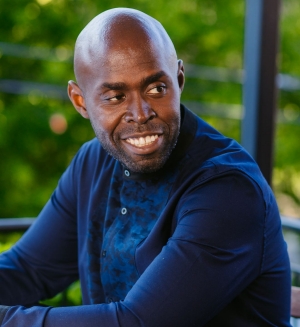IT specialist Sitsofe Kudjoe Dorvlo, MASc 08, recalls being “one of only two Black students” in his graduate-level engineering program at Concordia. “The percentage of Black students was what I would consider shockingly low.”
Born in Ghana, Dorvlo grew up in Nigeria and Oman and completed an MEng in Electrical Engineering in the United Kingdom before coming to Montreal. He set out to address the racial disparity in engineering soon after arriving at Concordia.
He joined the executive of the Concordia chapter of the National Society of Black Engineers, an organization whose mission is to increase representation in the profession for “culturally responsible Black engineers who excel academically, succeed professionally and positively impact the community.”
While numbers for Black representation in science, technology, engineering and mathematics (STEM) fields in Canada are hard to come by, a 2021 PEW Research survey in the United States showed that “Black workers comprise 11 per cent of all employed adults, compared with 9 per cent of those in STEM occupations.
"Their share is lower in some STEM job clusters, including just 5 per cent in engineering and architecture jobs. There has been no change in the share of Black workers in STEM jobs since 2016.”
Dorvlo’s approach towards promoting equality also included beginning at the source. “I started building a tutoring and mentorship program for elementary school kids who were struggling with math and science,” says the engineer, now senior project manager at the Montreal-based retail software management company Aptos.
Opening new doors
The main barrier Black children face to becoming engineers, Dorvlo says, is access. “I was very fortunate. My father did his PhD in statistics and was always encouraging my siblings and me in math and sciences. I was doing basic programming when I was 8! But not everyone has that opportunity. Unless you are really gung-ho about it, it’s hard to start learning to code after the age of 18 or 20. You need access to a computer and material.”
Youngsters also need tutors. So Dorvlo launched a Montreal chapter of the organization Black Boys Code, founded in Vancouver in 2019. “We run workshops two Saturdays each month that introduce Black boys to tech concepts such as machine learning and HTML coding.”
Dorvlo tries to organize workshops in a university setting so youth will get an early taste of the milieu. “We want kids to say, ‘Hey, I can survive here. I’m comfortable here. This is not foreign to me’.”
Educating parents is also part of Dorvlo’s work. “What Black kids see in media and on television are Black people in sports and music. We like to tell parents that there can only be so many LeBron Jameses out there. They have to make their kids’ education a priority.”
Becoming ‘more community concious’
Problem solving was a key skill Dorvlo learned at Concordia. “It was a very practical program that allowed me to do a lot of things.” He also appreciated how community-driven his university experience was.
“Being part of Concordia really helped keep me think I can be part of the solution to different social problems. I got to meet a lot of people from different communities, got to build relationships with them and become more community conscious.”
Dorvlo discovered his employer, Aptos, at an Engineering and Computer Science Career Fair. “I grew up in Aptos. I started with an internship and I’ve been there for 15 years now. I was part of a customer experience team, then grew into customer management. Today, I get to build relationships with customers, grow with them, talk about their business objectives, what they want to do, then make recommendations and help them out. I’m a bit of a problem solver.”
A member of Concordia’s Black Alumni Council, Dorvlo feels the university is making progress in boosting the proportion of Black students in science and engineering, but still lags behind other universities in Canada. “Places like Ryerson and York started programs 30 years before we did. But the Black Alumni Council is a very cool initiative and I’m looking forward to seeing that grow.”

 Sitsofe Kudjoe Dorvlo launched the Montreal chapter of Black Boys Code to get kids interested in concepts like machine learning and HTML from a young age.
Sitsofe Kudjoe Dorvlo launched the Montreal chapter of Black Boys Code to get kids interested in concepts like machine learning and HTML from a young age.